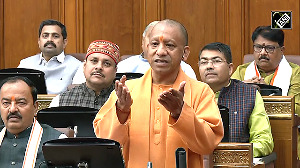 The government’s assured revenues from spectrum auction increased to Rs 1,02,215 crore on the tenth day. On Friday, the revenues had marginally come down to Rs 1,01,423 crore at the end of ninth day from Rs 1,02,057 crore on the eighth.
The government’s assured revenues from spectrum auction increased to Rs 1,02,215 crore on the tenth day. On Friday, the revenues had marginally come down to Rs 1,01,423 crore at the end of ninth day from Rs 1,02,057 crore on the eighth.
Six rounds of bidding happened on Saturday, with total number of rounds reaching 61 at the end of Day 9. The biggest ever auction of spectrum – in 800, 900, 1,800, 2,100 MHz bands — started on March 4. The auction is expected to go on till early next week.
The government had estimated Rs 80,000 crore-Rs 1lakh crore from the sale of spectrum.
"Brisk bidding was seen on the tenth day of auction, with activity requirement set at 100 per cent.
There is robust bidding going on in 1800, 900 and 800 MHz bands. At the end of 61 rounds, about 87 per cent of the spectrum has been provisionally allocated to bidders. The provisional amount committed by bidders stand at Rs1,02,215 crore.
Majority of service areas are going at a premium over reserve price. The competitive bidding is expected to continue.
There is still spectrum, which is yet to be sold,” said Department of Telecommunications (DoT). The DoT won’t be able to announce the final results of the auction because of a Supreme Court order barring it from doing so without its permission.
A hearing in the apex court in this regard is scheduled for March 26. The ongoing auction is crucial for many existing telecom players.
The licences of Idea Cellular (nine circles), Bharti Airtel (six circles) and Vodafone and Reliance Telecom (seven circles each) are due for renewal in 2015-16, which has made ongoing spectrum auction crucial for them.
Overall, 29 licences in 18 service areas are due for renewal in 2015-16.
These licences hold 184 MHz of spectrum in the 900-MHz band and 34.2 MHz in the 1,800-MHz band. Seven circles -- Bihar, HP, UP west, Gujarat, Odisha and Kerala -- which are must wins for some telcos, has seen prices going up by over 100 per cent.
Morgan Stanley in a note had said, “Operators would need a hike in tariffs of 5 paise or 15 per cent to neutralise its impact on profits. The spectrum is valid for 20 years and hence, there is a lot more certainty from a business continuity perspective.
Data growth is happening at a robust pace, which should aid overall revenue growth for the operators,” the note said.











 © 2025
© 2025